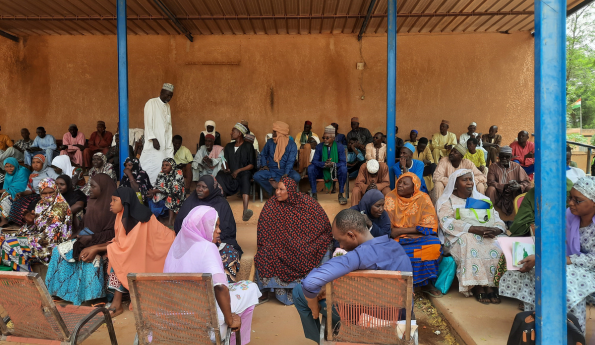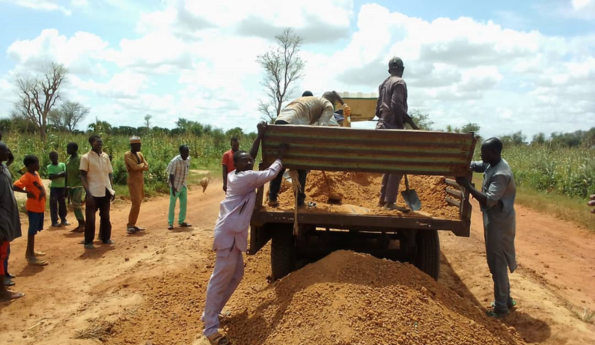On October 30, 2020, USAID, in partnership with the University of San Diego Kroc Institute for Peace and Justice, hosted an event featuring USAID Acting Administrator John Barsa, to celebrate the 20th anniversary of the UNSCR 1325, which advanced the Women, Peace, and Security (WPS) agenda.
The event, which was moderated by Jennifer Hawkins, Senior WPS Advisor, Bureau for Conflict Prevention and Stabilization (USAID), included Counterpart’s Director of Program Quality and Learning, Mehreen Farooq, along with Jennifer Bradshaw (Kroc School), and Lilian Kroc (IPJ Woman Peacemaker Fellow and President, South Sudan Women’s Empowerment Network), who discussed challenges, best practices, and the way forward to build equitable WPS partnerships.

Remarks delivered by Mehreen Farooq
Thank you, Acting Administrator Barsa, Associate Administrator McGhee and Jennifer Hawkins, along with the Kroc School for the opportunity to speak on the 20th anniversary of the passage of the UNSC 1325 Resolution.
For those of you who may be unfamiliar, Counterpart International is a non-profit organization that has partnered with USAID for over 55 years, strengthening the capacity of civil society to work in partnership with the public and private sectors on a range of issues from food and health, to governance security – particularly in fragile and violent-extremism affected states.
Our WPS work in Niger is an integrated component of a USAID-funded Participatory Responsive Governance Program- Principal Activity (PRG-PA). The program has helped develop Community Monitoring Committees across the country to strengthen service delivery in the health, education, and security sectors with the goal to bridge the gap between communities and government and reduce many of the grievances that are known to fuel radicalization to violence.
At about mid-point of our implementation we adapted our approach to elevate the role of women in these community-driven efforts. Although women and girls have unique access to multiple local sources of information and are the first to recognize radicalization in their social networks, they often remain on the sidelines as invisible first responders.
To augment the role of women peace builders, Counterpart International applied several approaches:
- First, we started by working with the grain. We engage traditional stakeholders including religious leaders to champion women’s inclusion by framing their engagement within a culturally appropriate paradigm, emphasizing the value of consensus-based decision-making.
We also work with community radio to produce content on the importance of women’s leadership in peacebuilding. These are important in shifting the public’s mindset of women’s role in engaging in security issues – which have traditionally viewed as a male-dominated sector.
- Next, we go beyond engaging what I like to call ‘the usual suspects’, to working with emerging leaders who wield social capital in popular settings like Village Savings and Loan Associations.
- From there, we focus on building up women’s soft skills so that they can effectively communicate and advocate for their local priorities. The key to our approach is to strip away any assumptions of what we – as INGOs – think is beneficial for local peace builders. Rather, we then work with our beneficiaries to understand social norms, structural barriers, and the day-to-day challenges that prohibit women from meaningful engagement in local decision-making, and then design our interventions accordingly.
In the violent extremism affected region of Tillaberi, for example, girls lack opportunities for leadership development in their schools so we helped women and girls develop action plans with parents and teachers to design sporting activities, community clean-up days, and peace clubs to mitigate conflict and strengthen their potential as young peace builders.
Where possible, we also leverage from local assets, connecting emerging leaders to peer mentors like female parliamentarians so that they have the resources to become effective stakeholders.
- Finally, we foster meaningful opportunities for engagement with government and security sector officials.
As a result of these efforts, 40% of our Community Monitoring Committee participants are now women and they are directly advocating for improved services to benefit their community including better security coordination.
Based on these emerging good practices, there are three things we could consider as we work to build equitable partnerships with women peacebuilders.
- First is recognizing the centrality of capacity strengthening to build up the potential for women to represent their communities’ interests, prioritize needs, and advocate for change. This requires improving their literacy, providing them with civic education, and enhancing their communications and public speaking skills.
- Second, we must look beyond established leaders with connections to political elites – and engage the next generation of peacebuilders. This may include redefining what leadership looks like, and looking to engage young leaders who wield social capital and have a passion for change.
- Third, we must recognize the set-backs posed by COVID-19. Due to the pandemic, women spend less time on paid work and more time on domestic work, including caregiving, hygiene, and cooking – which significantly decreases their time and availability to engage in civic activities. So we have to find ways to tailor our engagements in way that is constructive to women’s time.
This is not an observation that is limited to Niger.
We have seen similar challenges around the world. In a June survey of alumni from Counterpart’s WomenLead Institute – a global women’s leadership development initiative, generously funded by ExxonMobil:
- 74 % reported either a significant or complete disruption to their organization as a result of COVID-19
- 42% reported a change in funding. Of those:
- 35% saw a decrease in funding available;
- 15% reported new funding available only for COVID-19 response;
- 13% reprogrammed existing funding to responds to COVID-19; and only
- 2% saw an increase in funding available.
To meet their immediate needs, Counterpart International launched a Global Giving campaign to provide emergency funds.
A final lesson learned from this is that we must think about the long term and support local peacebuilders in developing sustainable solutions so that they are less reliant on foreign donors.
I’ll end with an example of where this has worked well, with a short story from the Zinder region in Niger where a small integrated health center was struggling to keep up with demand – particularly of expectant mothers where extended wait times were leading to complications during labor.
To address this challenge, women from Zinder approached one of the Community Monitoring Committees that Counterpart had helped establish, and launched a series of town hall consultations and asked local citizens and government for donations to build a waiting room for the maternity ward of the health center. Within a month, the Committees raised 30,000 CFA from the local government and 100,000 FCFA from the community, and construction began soon after.
It just goes to show that when women’s voices are deemed credible, and when they are valued stakeholders of their community, they can mobilize resources and foster their own self-reliant solutions.




